- Home
- Thornton Wilder
Penelope Niven Page 3
Penelope Niven Read online
Page 3
In 1902 he angered some of his fellow citizens when he “tried editorially to ride both a La Follette and a Spooner horse going in opposite ways.”47 Both men were Republicans running for reelection—Robert La Follette for governor and John Spooner for U.S. senator. They were rivals, if not political enemies, and Wilder used his editorial podium in June 1902 to criticize La Follette’s political tactics, warning that “Mr. La Follette’s political future lies not in rough riding, but in tact, fairness, in open, hearty co-operation with these elements of the party that seeks the just thing and will play fair.” He went so far as to suggest that if La Follette’s political attempts to humiliate Spooner continued, there might be “a great number of those who supported the Governor [who] would be most eager for his overthrow.”48 This was an insinuation that La Follette would not forget.
Dr. Wilder was a strong proponent of the suffrage movement, writing and speaking in favor of “equal suffrage” for the “modern woman.” He carried his message far and wide in speeches, arguing that the “competency of the modern woman” was a strong imperative for granting women the right to vote. While women may once have been “mentally inferior,” Wilder said, the ground had shifted, and the intelligence of the modern American woman was demonstrated in her growing participation in the professions. Now that women were “no longer dependent on men,” and “no longer generically domestic,” he contended, all arguments that justified the rights of men to vote at last applied as well to women, who needed the ballot to protect themselves, to enrich their lives, and to exert their influence for the good of the society. “Women have quick intuitions,” asserted Dr. Wilder, son of one strong woman and husband of another. “The mother instinct would still be aggressive, and it is one to trust. It is a man’s government now, and shows the absence of woman’s conscience and devotion to simplicity and truth. Organized womanhood thrown into the disposal of problems, local and national, would be a power for good.”49
When he was not stirring up controversy with his editorials or captivating audiences with his speeches, he was busy at Madison’s First Congregational Church, the second-oldest church in the city. Amos and Isabella had joined the church on May 3, 1895, when he transferred his membership from the South Congregational Church in Augusta, Maine, and she hers from her father’s church in Dobbs Ferry, New York.50 Even so the Wilders had traveled back to Dobbs Ferry so that baby Amos could be baptized by Isabella’s father in his church, but Thornton was baptized in Madison.51 Dr. Wilder was a church deacon for seven years, beginning in 1902, and also served “long and exceptionally well” as superintendent of the Sunday school.52 According to a story Thornton told many years later, his father would sit between his two boys for the Sunday services. During Dr. Eugene Grover Updike’s sermon, Dr. Wilder would let his boys draw pictures on the starched white cuffs of his shirtsleeves.
One of their neighbors recalled in later years that Dr. Wilder insisted that his newspaper must be “clean enough” for his children to read it, for he was “alive to the needs of growing families.”53 Even then Thornton was known beyond the family for his curiosity, and he had already fallen in love with libraries. The children’s librarian at the public library more than once found him “contentedly wandering the aisles of bookstacks open to staff only.” She would lead the boy back to a small table laden with books from the children’s section and encourage him to read there.54 The Wilder home was full of books, and the children grew up reading and being read to—Sir Walter Scott, Dickens, Thackeray, and many more. Sunday readings dipped into the Bible and the works of John Bunyan, George Fox, and Henry David Thoreau.
Often on Sunday afternoons Dr. Wilder took his brood for a walk around Madison. The children enjoyed “the exciting and noisy city Water Works” and “the steps of the towering State House” and “the promenade along Lake Mendota.” Isabel remembered that Thornton loved going with their father to the Wisconsin State Journal offices to see the printing presses spouting out the newspaper, and with his own hands to “push the keys on Father’s typewriter to see words come out on paper.”55 His father introduced him to the thrill of words on paper, and his mother took him to see his first play, a production of Shakespeare’s As You Like It in a Milwaukee theater, where they had balcony seats.56 His brother recalled that Thornton was “addicted to clowning and striking poses, and took part early in the costuming and tableaux of Christmas events in the Sunday School.”57 These were the wonders of Thornton’s life as a small boy—ordinary days full of familiar pleasures, interspersed with extraordinary events that seemed to him immensely exciting and colorful.
His father especially treasured the memories of those years. He wrote to his children in 1910:
When your Papa is “gone before” remember that in our little cottage with [his] wife and children were the happiest years of his life. He had heavy burdens in the city but when he walked along the lake shore in the early evening and saw the “lights of home,” the cares slipped off like a harness—sweet children awaited him at the gate, or ran down to meet him—the mother with supper spread on the verandah; the pleasant converse, the reverent quiet, worship, each one joining in—the “all still and quiet”—Papa’s few moments alone under the stars, with the wind murmuring through the forest in the rear—the restful sleep—those were the precious years.58
“Did you have a happy childhood?” an interviewer asked Thornton Wilder in 1957 when he was famous around the world.
“I think I did, but I also think that that’s a thing about which people tend to deceive themselves . . . ,” he replied. “Yet I am convinced that, except in a few extraordinary cases, one form or another of an unhappy childhood is essential to the formation of exceptional gifts. Perhaps I should have been a better man if I had had an unequivocally unhappy childhood.”59
2
“A FORETASTE OF HEAVEN”
It used to be said that to have lived in China during those years between the Boxer Rebellion and the 1911 Revolution was to have enjoyed a foretaste of Heaven.
—THORNTON WILDER,
“Chefoo, China,” unpublished manuscript
China and California (1906–1909)
Just ten days before his ninth birthday, Thornton Niven Wilder set out on one of the greatest adventures of his life. His ambitious father and his harried mother had decided to move their family from the tranquil streets of Madison, Wisconsin, to the British Crown Colony of Hong Kong, China, where Amos Parker Wilder would become U.S. consul general. He was appointed to the post in 1906 by President Theodore Roosevelt after months of political wrangling.
At the time Dr. Wilder, father of four, editor and owner of the State Journal, and president of the State Journal Printing Company in Madison, Wisconsin, was still trying to repay the loans that had made it possible for him to buy a half interest and then the full interest in the paper. His “coaching of talented young reporters and his editorials became quasi-legendary,” and stories abounded about his “unconventional assignments and irascible fiats in the editor’s sanctum,” his son Amos remembered, noting that his father “took pride in the fact that his was the first daily paper which refused to accept liquor advertisements.”1
His newspaper was a visible podium, and Dr. Wilder used it aggressively. While he had earlier supported Governor Robert La Follette’s “progressive” political movement, he grew wary of La Follette’s increasing power, and by 1904 had turned his support to the “Stalwart” branch of the Republican Party—the older, wealthier, conservative movement represented by Senator John Coit Spooner. Year by year Dr. Wilder took an increasingly confident, independent stance in his editorials and in his speeches. He frequently gave rousing motivational speeches. A perennially popular Chautauqua lecturer and speaker to civic and cultural groups throughout the United States, he often relied on humor to capture and hold an audience’s attention. At a dinner meeting of the National Municipal League in New York in April 1905, for instance, he had the audience “roaring” with laughter, the New York Times r
eported.2 Wilder was praised for his “brilliant style and his independent opinions,” and hailed as “one of the country’s greatest authorities” on the issue of better municipal governance.3
By the spring of 1905 he had begun to consider other career options, tentatively exploring the possibility of foreign service and actively lobbying for a diplomatic appointment. He solicited the help of Secretary of War William Howard Taft, whom he had known at Yale. “I know the President is anxious to do something, but that is indefinite. [Senator] Spooner, too, is anxious, but the question is ‘How,’ ” Taft wrote April 14, 1905, in response to Wilder’s persistent inquiries. In 1905 there were rumors in the press that he was going to receive a diplomatic appointment to Venezuela, but instead he was offered the position of American consul general in Hong Kong.4 He traveled to Washington on January 24, 1906, to take the State Department examinations to qualify. The Racine Daily Journal reported that Amos P. Wilder had “recently been appointed United States consul general to Hongkong, China, one of the most important diplomatic posts at Uncle Sam’s disposal,” but that La Follette, newly elected to the senate from Wisconsin, had opposed his confirmation, “and the final result is still in doubt.”5
“Thus far the principal senatorial service of Robert Marion La Follette has been to hold up the consular appointment of his distinguished fellow townsman, Amos Parker Wilder, of the Madison State Journal,” the New York World reported, adding that Wilder was a friend of Wisconsin senator Spooner, who supported the diplomatic appointment that La Follette sought to block. The World noted that “some people think the United States government lucky to get men like Mr. Wilder to accept consular appointments.”6 Senator La Follette, with whom Wilder had clashed politically since the 1902 election in Wisconsin, opposed the appointment on the grounds that Amos Parker Wilder was “personally offensive to him,” but Wilder’s supporters prevailed and, with President Theodore Roosevelt’s blessing, Wilder set out in March of 1906 to assume “one of the top consular positions at that time.”7
It meant uprooting his wife and children from their comfortable life in Madison and transplanting them to the Far East, but he believed he could make money and an international reputation in China. In March 1906 Parker and Isabella and their four children traveled by train from Wisconsin to California, where on April 7, 1906—just ten days before Thornton’s birthday, and eleven days before the devastation of the April 18 earthquake—they boarded the SS Siberia for the monthlong voyage from San Francisco to Hong Kong.8
The journey was the most exciting adventure that had ever befallen the Wilder children—Amos, now ten and a half; Thornton, almost nine; Charlotte Elizabeth, seven and a half; and Isabel, recently turned six. First there was the thrilling experience of riding the Atchison, Topeka & Santa Fe train through the vast American landscape, from Madison to San Francisco. The children roamed the train by day, and at night, knelt obediently by their Pullman car berths as their father led them through the hymn singing, scripture reading, and prayers that made up their bedtime ritual at home.
Then there was the fascination—sometimes terrifying, sometimes enchanting—of eating, sleeping, and living aboard the huge steamship, a world of its own, traversing the immense open sea. “Our trip was delightful—no sea sickness—on many days there were not even white-caps on the water,” Dr. Wilder wrote to his mother. He and Isabella were seated at the captain’s table. Father and children mingled with the passengers, including a group of missionaries en route to China, while Isabella rested from the exhaustion of the move and her anxiety about its outcome. After a few days at sea, however, she “resumed her health,” her husband reported, and then “of course made friends with all.”9 The ship stopped in Hawaii for a few days, and put in for two days at a time at three Japanese ports, opening exotic new vistas to the Wilder children.10 Thornton had looked forward to celebrating his birthday—April 17—on the voyage, unaware that when the ship crossed the international date line on April 16, the seventeenth would disappear entirely, but it was celebrated anyway.11
He was a thin, effervescent boy, with shaggy dark hair and vivid blue eyes alight with curiosity. He could be shy with other children, and gregarious with adults. One of his shipboard friends kept a diary—lined pages bound in green leather, with a gold-colored metal lock and key. Thornton was so impressed that he began his own makeshift journal on the blank side of the heavy paper on which dinner menus were printed each evening. Yung Kwai, the head steward of the children’s table, handed out the leftover menus as souvenirs, and Thornton put them to immediate use, filling them with words, and then, with the steward’s help, hiding the pages under the cover of an empty table in the corner of the dining salon. At the end of the voyage Thornton and his little sister, Isabel, went to collect the hidden journal pages, only to find that they had disappeared.12 Sadly, Thornton’s first journal, begun in April 1906, did not survive his first ocean voyage, but there would be journals, letters, and manuscript pages in the future, many of them composed at sea.
THE WILDERS arrived in Hong Kong May 7, 1906, and temporarily moved into the King Edward Hotel, one of the two largest in the city. At night, from the veranda of their rooms, they looked out at a city sparkling with lights like a “fairy-land.”13 Because there was no permanent residence for the consul general in Hong Kong, Dr. Wilder was expected to pay rent for appropriate quarters from his salary of $8,000 per year. Beginning on June 1, he leased a large furnished house for $112.50 in gold per month. The house was located on Victoria Peak, known as the Peak, a mountain overlooking the city and harbor. “It is a fitting place for a great man,” Dr. Wilder teased in a letter to his mother.14
Colonial officials sought residences on the Peak not so much for the views as for escape from the oppressive humidity of the city. The Wilders’ rented house and sprawling lawns had previously been occupied by a succession of high-ranking Western officials and their families, and came equipped with Chinese servants. Thus the Wilders inherited Wong, the “number one boy,” who had worked for American consuls for many years, and so spoke fluent English. For a salary of ten dollars a month, Wong ran the household, hiring and supervising a staff composed, Dr. Wilder reported, of “a cook, a cook’s helper, a house coolie, a gardener” among others, including a tailor, a laundryman, and, for nine dollars a month, an amah for the children—an “oldish woman” who was kind but, like most amahs, did not have “any control over children.”15 The house was reached by “a steam tram pulled by a wire rope which runs up 1400 feet like this,” Dr. Wilder wrote, adding, “it is the steepest thing in the world.”16
Such were the wonders of the new city surrounding Thornton and his siblings. In addition to thrilling rides up and down the Peak, they rode about the city in the standard conveyance—sedan chairs, each carried by at least two coolies, garbed only in breechcloths. Their father took the children on the streetcar line that ran for about four miles along the shore. Their amah took them for walks and watched over them while their mother was busy with her official duties—teas, tiffins (luncheons), and afternoon social calls. They tasted strange new foods, and, carefully supervised by their elders, went on swimming parties and explored the city, transfixed by the constant swirl of people and traffic. They attended the German school their parents had deemed the best option for their education in Hong Kong, riding in sedan chairs for tutoring every day after tea. They went to church weekly to hear the “grim language” of the ministers—“English and Scotchmen [who] quite outdo even me in theology,” their father observed.17
The Wilders settled into a comfortable domestic routine at the Peak, surrounded by servants to see to their every need. The family ate breakfast and lunch together, but the children had an earlier dinner than their parents—“a jolly meal together with Wong, our ‘No 1 Boy’ and generalissimo in charge of house, and his assistant ‘Ah Fie’—a boy of 17—to wait on them,” their father wrote. “But, of course, I skirt about and quiet their quarrels. After their meal, they romp on the croquet ground,
perhaps playing tag with Wong; and then they undress—and then we read all except the baby from little copies of Luke—each child taking turns.”18 He predicted that he and his wife and children would be content in Hong Kong “for a period of years.”19
AMONG HIS papers Thornton Wilder left a twenty-page manuscript of semiautobiographical reflections titled “Chefoo, China”—as noted earlier, a fusion of memory, imagination, fact, and fiction, written in the late 1960s and embroidered here and there with strands of drama. Decades after his time in China, with an accuracy of detail confirmed in his father’s letters of the period, Wilder described the luxurious life afforded to “foreign devils,” such as his own family, who came to China from the “barely civilized powers of Europe and America.” In his view diplomats, businessmen, and even missionaries enjoyed a lifestyle that many of them could never have afforded at home. “It used to be said that to have lived in China during those years between the Boxer Rebellion and the 1911 Revolution was to have enjoyed a foretaste of Heaven,” Wilder wrote in his manuscript draft. He recalled the “skilled and tireless servants who worked for a six-to-ten dollar monthly wage”; the “superb cooks and spirited gardeners”; the tailors who could reproduce the latest styles from Paris and London; the traveling from place to place in sedan chairs borne on men’s shoulders, and the more modern rickshaw once rubber tires were available in China.20
Wilder remembered more than sixty years later that “ ‘Old China hands’ still referred to those days as sheer Heaven,” despite the fact that Americans and Europeans in China were surrounded by the social and economic problems facing the Chinese people.21
And, he wrote, perhaps with some dramatic license, “My own father—a rugged individualist from the state of Maine—returning to America after fifteen years was unable to tie his own shoes without a spasm of annoyance.”22

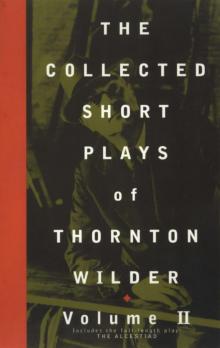 The Collected Short Plays of Thornton Wilder, Volume II
The Collected Short Plays of Thornton Wilder, Volume II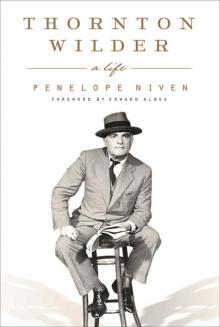 Penelope Niven
Penelope Niven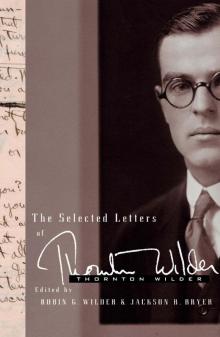 The Selected Letters of Thornton Wilder
The Selected Letters of Thornton Wilder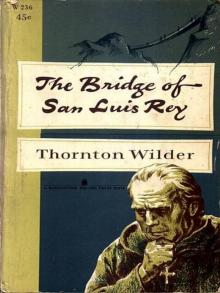 The Bridge of San Luis Rey
The Bridge of San Luis Rey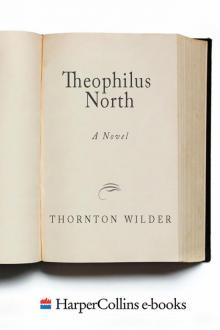 Theophilus North
Theophilus North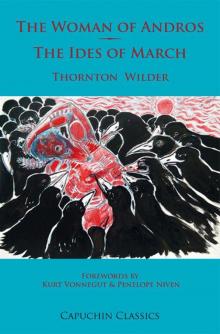 The Woman of Andros / the Ides of March
The Woman of Andros / the Ides of March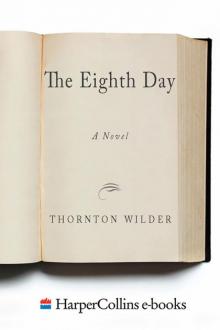 The Eighth Day
The Eighth Day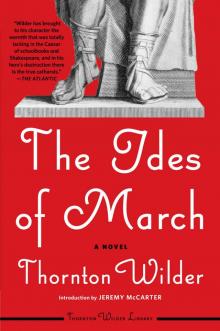 The Ides of March
The Ides of March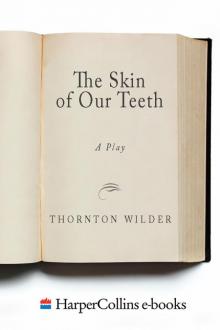 The Skin of Our Teeth
The Skin of Our Teeth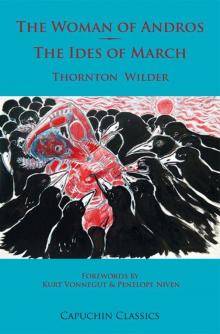 The Woman of Andros and The Ides of March
The Woman of Andros and The Ides of March